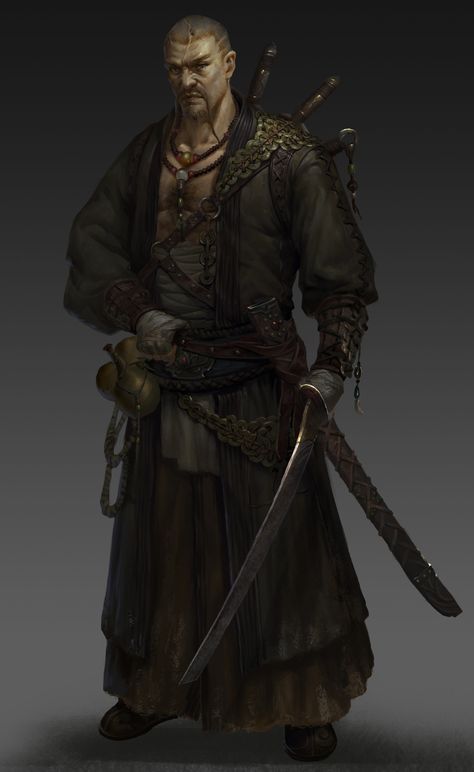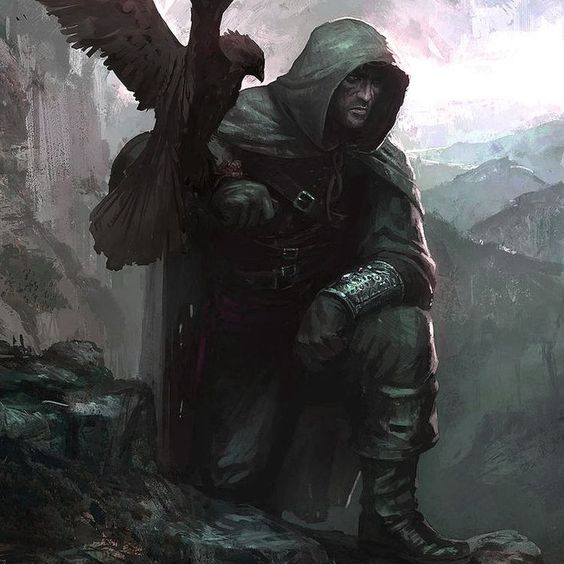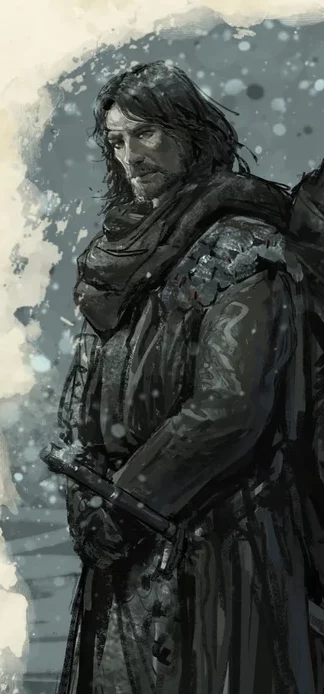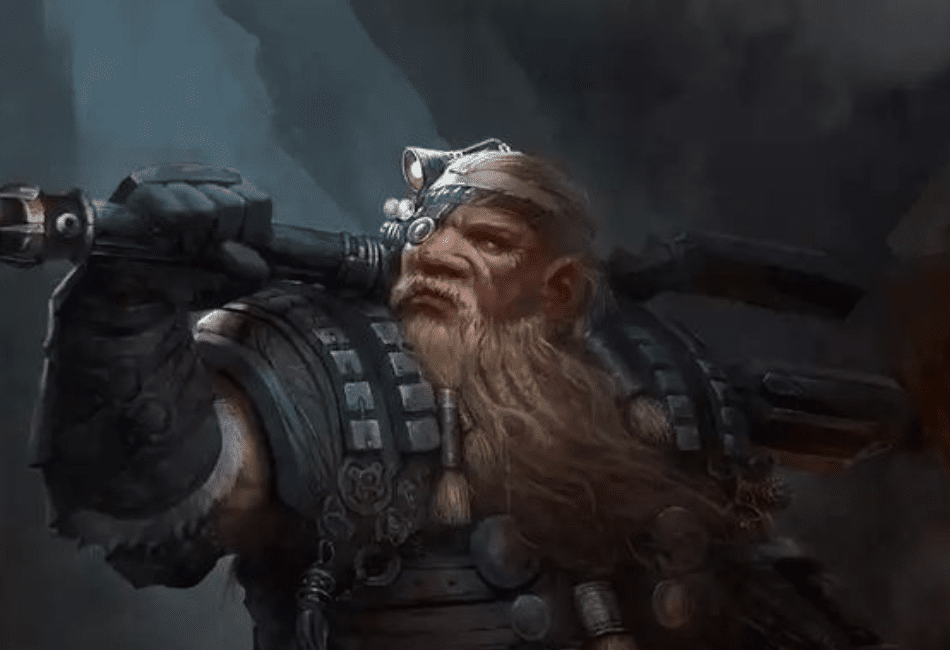An Outlander 5e guide helped me create the Ranger of my dreams a few years ago. Outlander is a great background for Rangers because the tie into nature is crucial to both of them.
The Outlander feels one with nature because it’s where they choose to reside. Though they live in nature, they don’t have to be a simple forest dweller who doesn’t even speak Common.
There’s a lot more to the Outlander than meets the eye. Some Outlanders are even more advanced than city-dwellers. They choose to live away from society, and I don’t blame them.
Outlander Overview in DnD 5e
The Outlander is a background in Dungeons and Dragons. Any class or race can be an Outlander, but it’s most common with Druids and Rangers. The Outlander has proficiency in Athletics, Survival, and one musical instrument.
They also can speak one extra language and have a feature called Wanderer. Through this feature, they rarely get lost – or go hungry or thirsty – in areas that they have seen in person or on a map.
The general gist of the Outlander is that you live away from popular society and settle alone or with smaller communities. This can be anywhere in a small village or in nature – any biome will do.
Outlander 5e Proficiencies

The Outlander has three proficiencies. Two skill proficiencies and one tool proficiency. You can’t interchange these proficiencies unless the DM says that you can. Without the DM’s green light, they also do not stack with other proficiencies.
Athletics
If you’re like me, you get Athletics and Acrobatics mixed up. To utilize Athletics, you need decent Strength. When you are proficient in Athletics, you are better at climbing, not getting knocked over, and jumping far.
You are also better at swimming, pushing, and pulling. Anything non-gymnastics related yet still a sport is Athletics. Learn the difference, and don’t be mad at your DM when he says you must roll Acrobatics when needed.
Survival
Survival is a reasonably straightforward skill. You use it whenever you’re identifying plants, animals, or water sources. You can even use it for hunting, watching, and finding your way home.
Musical Instrument
I recently wrote a guide on musical instruments in D&D. When you’re an Outlander, you can choose one of those instruments and gain proficiency in it. This allows you to play it with your proficiency bonus added to Performance.
Outlander Languages
The Outlander can choose one language from the basic languages. If you want a special language, you have to clear it with the DM. Otherwise, you can choose from this list of languages.
Note: exotic languages not included
- Common – almost everyone
- Dwarvish – Dwarves
- Elvish – Elves and other Fey
- Giant – Giants, Ogres
- Gnomish – Gnomes
- Goblin – Goblins
- Halfling – Halflings
- Orc – Orcs
Outlander Equipment
The Outlander gets standard equipment tailored to its skills. This is what you should have with you whenever you choose Outlander. You may also be able to sell it all and have whatever it is worth in gold instead.
- A Staff – a simple wooden staff, decorated any way that you like
- A Hunting Trap – a trap for medium to small animals
- Trophy (from an animal you slew) – a hoof, head, or anything else you can think of that the DM allows
- Traveler’s Clothes – simple cloth clothing made for the standard elements
- Belt Pouch With 10gp – unless DM does random gold
Outlander Feature
The Outlander feature is called Wanderer. The feat Wanderer ensures that you have an excellent memory of maps and geography. You have a photographic memory when it comes to maps.
So as long as you’ve been somewhere or have seen maps of it, you won’t get lost. You know where the nearest food and water is and can feed up to five people each day in the given area.
Outlander Specialty
The Outlander’s specialty is their occupation, or at least their former occupation. You can either roll to decide what it was or choose the one that fits your backstory the best in your eyes.
Now, I know that these can be confusing, so I’ll try to explain each of these from the Outlander’s perspective.
Forester (1)
The Foresters are members of a woodland army of sorts. You are great at working with your hands when it comes to carpentry and have learned to watch over those who are close to you.
Trapper (2)
The Trapper’s job is relatively straightforward. You capture animals to skin and butcher. You may also be good at setting traps for unsuspecting enemies, but your specialty arrives in bringing home the bacon – literally.
Homesteader (3)
The Homesteader is fantastic at picking up their roots and dropping them somewhere new. You adapt to new areas well and can create a home anywhere, as you specialize in self-sustainability.
Guide (4)
The Guide is very good at finding its way home or through any terrain. You could probably safely make your way through the forest blindfolded – knowing the dangers that are nearby.
Exile or Outcast (5)
The Exile isn’t a straightforward choice. You can get creative with this one as long as you remain an outcast. You can either be someone who betrayed their village or don’t believe the same way that your tribe does.
Bounty Hunter (6)
A Bounty Hunter hunts wanted people down, typically on behalf of the village. You specialize in hunting these criminals down outside of town. You’re good at gathering information and tracking them down.
Pilgrim (7)
The Pilgrim is similar to the homesteader. The difference is that they are likely traveling for religious reasons or some similar, yet just as serious cause. You are looking for a home to accept you.
Tribal Nomad (8)
The Tribal Nomad lives close to nature, as many Outlanders do. However, they will even move during different seasons – with their people – never making one place their home.
Hunter-Gatherer (9)
Despite the name, the Hunter-Gatherer is more of a self-sustaining food searcher than a hunter. You are great at finding sustenance no matter where you’re at – whether it be berries, edible grass, or rabbits.
Tribal Marauder (10)
Tribal Marauders are not usually of a Good alignment. When you choose this path, you aren’t afraid to pillage other villages for food if need be. If you’re Evil, you may even do so for fun.
Outlander Backstory Ideas

You can use any backstory that you can think of for an Outlander. However, if you want something that fits – yet is interesting – you may need to think outside the box.
If you want an idea for Outlander backstories, a good route to take is to create your own with a few tips to get you started and in the right direction.
Character Inspiration
What I like to do is pick a character from a movie, TV show, or book and base my character on them. I have even based a character on an MtG card before, which worked out well.
In the end, the character is always different from how it started. This is a good thing because the difference is your influence on its creation – so it’s still uniquely you.
Specialty as a Base
If you choose a specialty before choosing the backstory for an Outlander, you can use it as fuel. For example, if you’re an Exile, you can easily base your backstory on it.
Let’s say that you were born in a strict, religious tribe away from the city. There were arranged marriages, and when it was your turn to get married, you ran away in search of true love.
Choose a Biome
When I imagine Outlander, I imagine a forest. But you can choose any biome you want. You have to make sure it’s possible in your campaign setting; then you’re home free.
Choose snowy mountains for an exciting spin or the desert for something different. The specialty and character you use for inspiration may affect this significantly, or you can choose your favorite biome.
Family Ties
Family is essential to many Outlander backstories. But to some, their family is the bane of their existence. You may notice that no matter the background, family always gets mentioned in backstories.
But in the Outlander’s case, family is usually the root of everything. They likely weren’t born in the forest and raised by wolves, but even if they were, the wolves are still their family.
Class Objective
The class you choose may affect your backstory. A Rogue and a Cleric may not have the same specialty nor the same goal as an Outlander. The class objective refers to why you’re the class that you are as an Outlander.
You may already know why you’re an Outlander, but if you can find out why you are the class you are, it may be a better way to write your backstory. Ask yourself why you chose that class?
Outlander Characteristic Ideas

Check out the Player’s Handbook if you want to roll for a random yet common characteristic. But if you want my original traits, ideals, bonds, and flaws, then check out my custom Outlander Characteristic Charts.
Personality Traits
| 1d8 | Personality Trait |
| 1 | I can’t stop exploring new places |
| 2 | I value the life of animals above others |
| 3 | I have no care for wealth |
| 4 | I salvage everything – even if others call it trash |
| 5 | I try to make friends with every living thing |
| 6 | I try to make every day count |
| 7 | I want to forget the past |
| 8 | I rarely speak |
Ideals
| 1d8 | Ideal |
| 1 | Love. Family is all that matters, and I will return to them one day. (Good) |
| 2 | Nature. We will die, but nature shall live forever. (Neutral) |
| 3 | Faith. I will give up everything for my god. (Lawful) |
| 4 | Independence. Life on the road is the only life worth living. (Chaotic) |
| 5 | Logic. A reality check is not the opposite of kindness. |
| 6 | Power. Society doesn’t deserve the freedom they’ve been given. (Evil) |
| 7 | Change. Each day is a day for change, evolution, and growth. |
| 8 | Respect. My life is mine, and yours is yours. |
Bonds
| 1d8 | Bond |
| 1 | I leave every leaf unturned and untouched unless I need it; nature is an extension of me. |
| 2 | Everyone knows my tribe, and I must carry on their legacy in the world. |
| 3 | I owe my life to the Hermit who raised me after he found me as a baby. |
| 4 | I want to be left alone in the wilderness to play music and eat berries until I die. |
| 5 | I must reproduce and create my own tribe, so I search for love. |
| 6 | I hold everyone who ever was kind to me dear and will repay them. |
| 7 | I believe I was a different species in my previous life and I still feel connected to it. |
| 8 | I am connected to the spirit world and can only feel it in nature. |
Flaws
| 1d8 | Flaw |
| 1 | I hate walking |
| 2 | I have no manners |
| 3 | I am addicted to alcohol |
| 4 | I can’t handle insults |
| 5 | I always keep way too much food on me |
| 6 | I laugh at inappropriate times |
| 7 | I will steal to feed my tribe |
| 8 | I am a penny-pincher |
Outlander 5e Guide: FAQs
Question: What is an Outlander 5e Staff For?
Answer: If you’re a non-magic class, you can use the staff for walking, as a martial weapon, or anything else. But if you’re a magic class, you can use it as an arcane focus to cast spells.
Question: Does an Outlander Start Out With Much Gold?
Answer: The Outlander starts out with 10gp inside a small pouch, which is pretty average and is what most backgrounds start with. The Noble starts with the most gold at 25gp.
Question: Is Outlander a Good Background?
Answer: Outlander is a good background as far as I am concerned. I love nature-inspired backgrounds, and the Outlander is just that. They have the perks that go hand-in-hand with nature.
Outlander – Should You Choose It Or Not?
Outlander is a unique yet popular background. It revolves around living in – usually growing up in – a community far from society. This can be a small family community or a larger village.
The point of the background is that you are close to nature and haven’t spent a lot of time in larger cities. I find this to be perfect for Nature-based classes like the Druid, Ranger, or Bards with specific colleges.
- Augury 5e Guide – The Vaguest and Coolest Cleric Spell - September 5, 2022
- Roc 5e Guide – The Big, Dumb Bird You Don’t Want To See - September 5, 2022
- Best Drow Name Ideas – From Alvin to Sânziana - August 30, 2022



